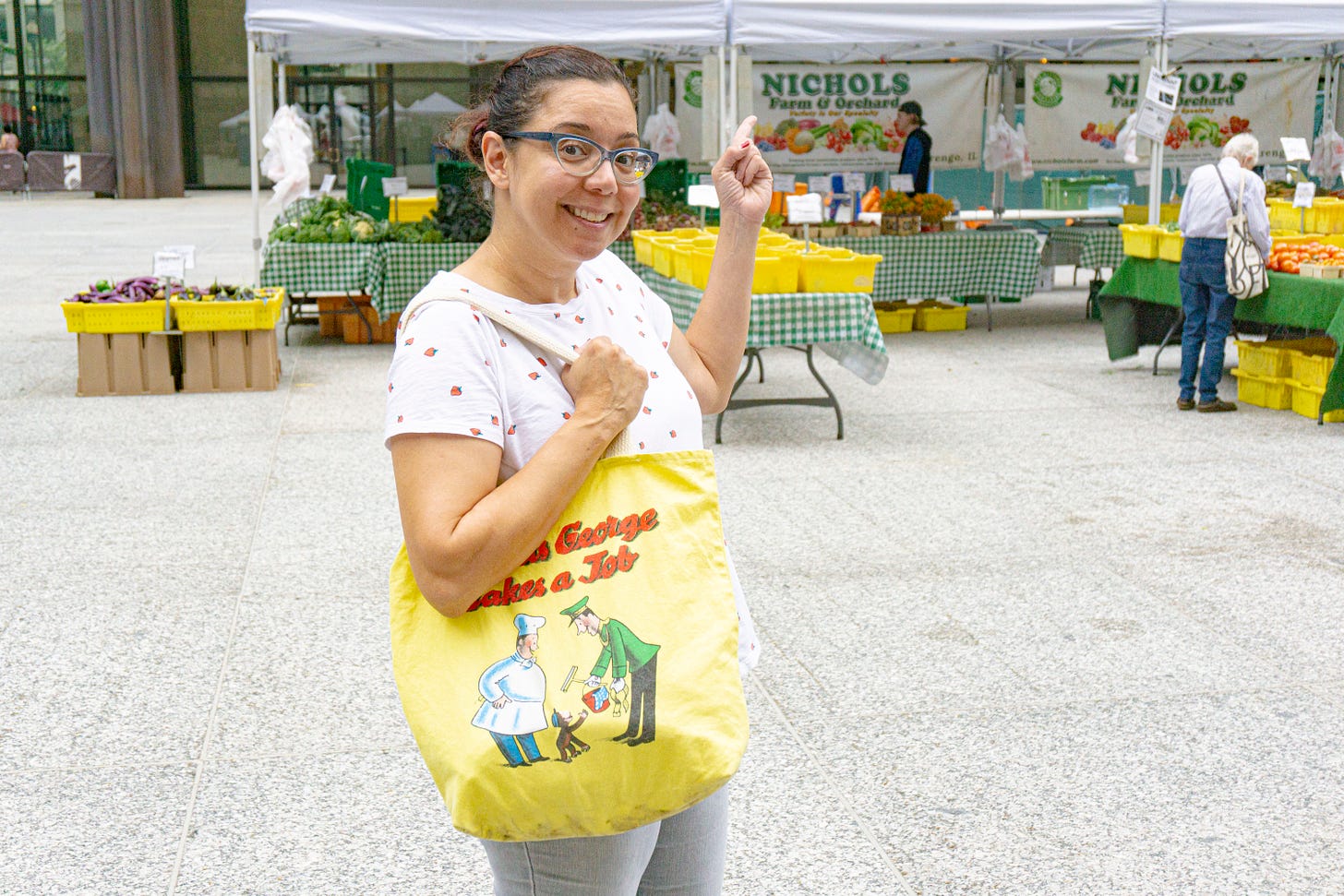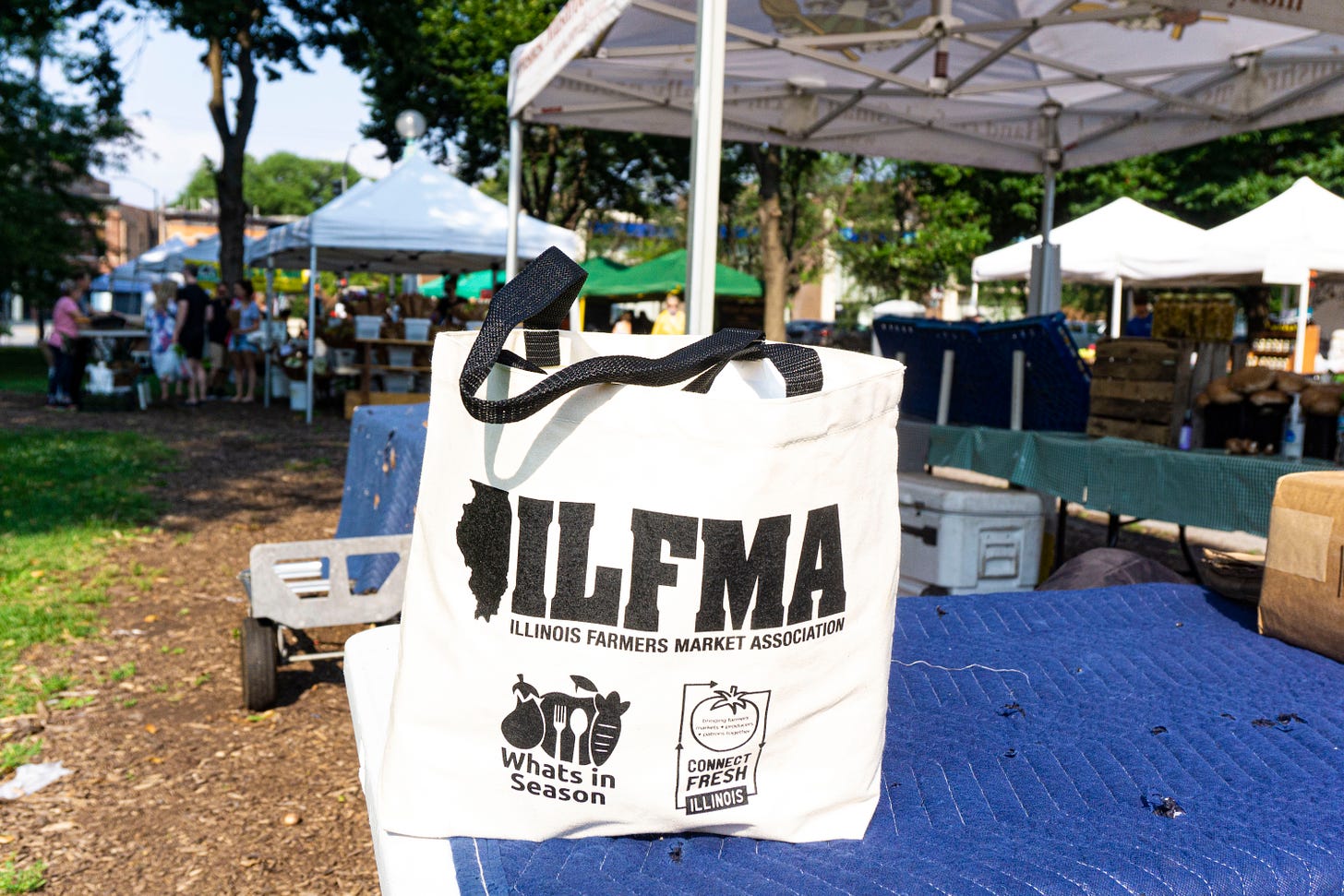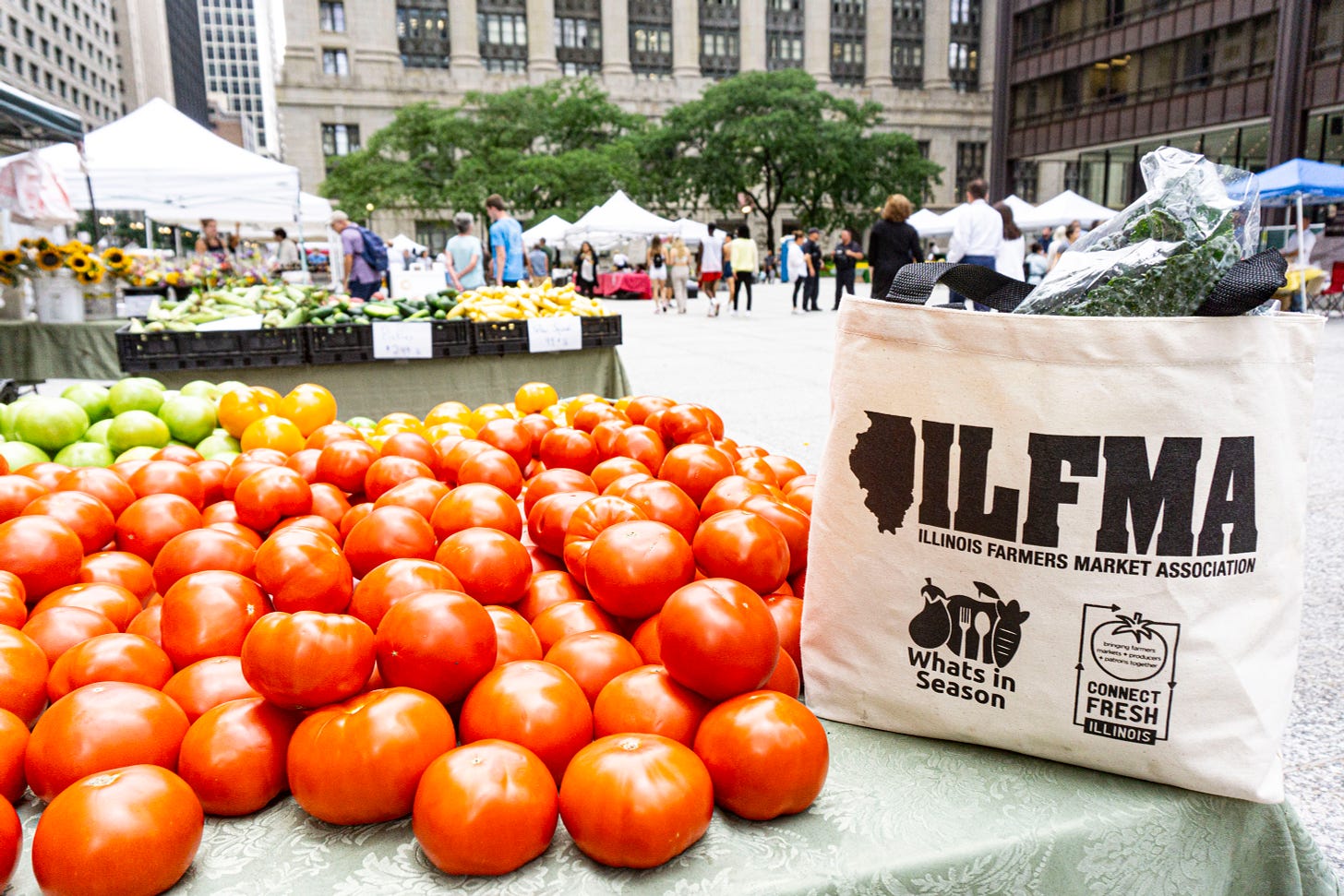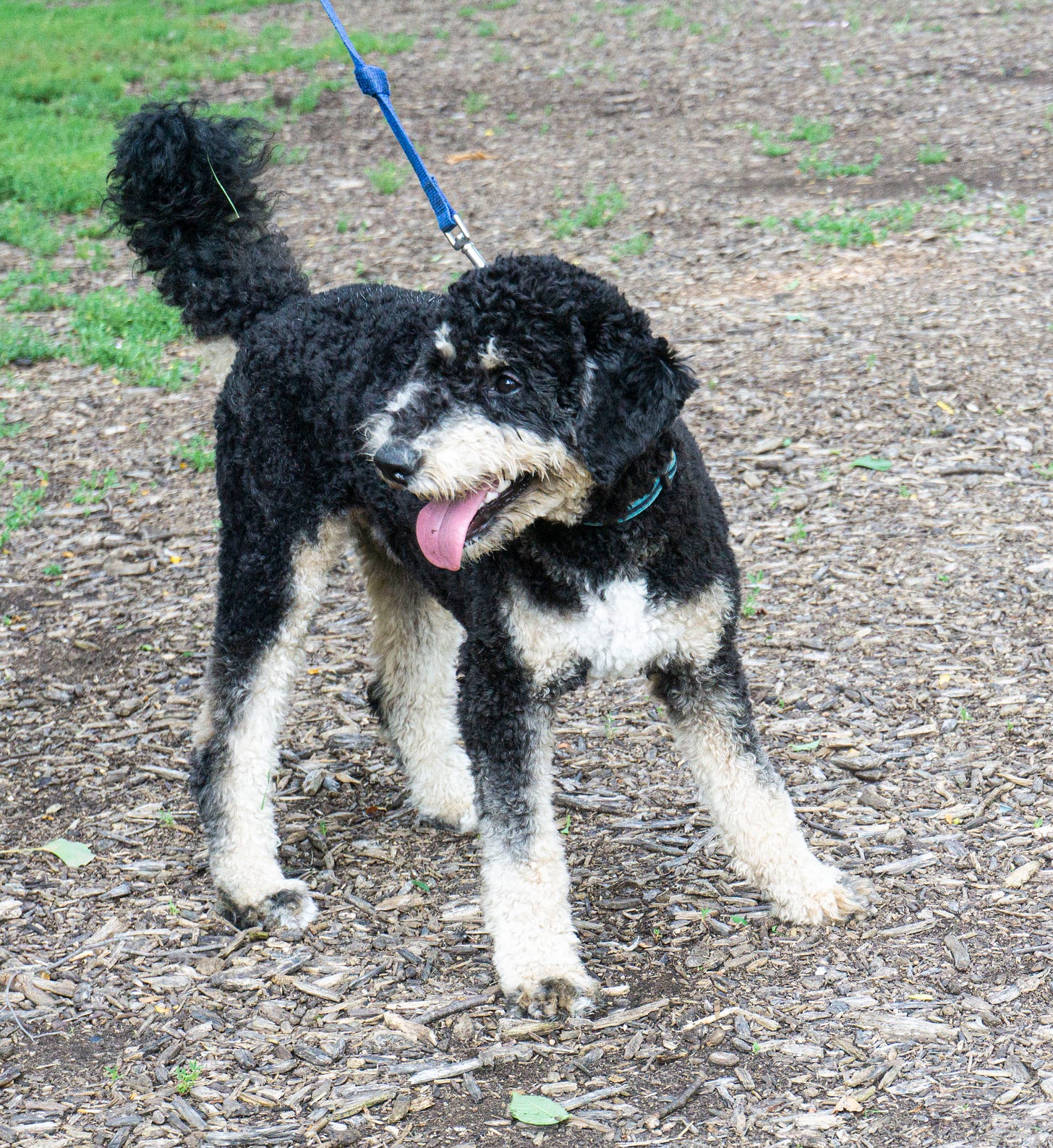Chicago City Markets & Farmers Market Week
Q&A with Yescenia Mota, who has headed the public markets for 18 years
In This Issue
• Chicago City Markets and Farmers Market Week
• Travels of the ILFMA Tote
• He Wags for Queso
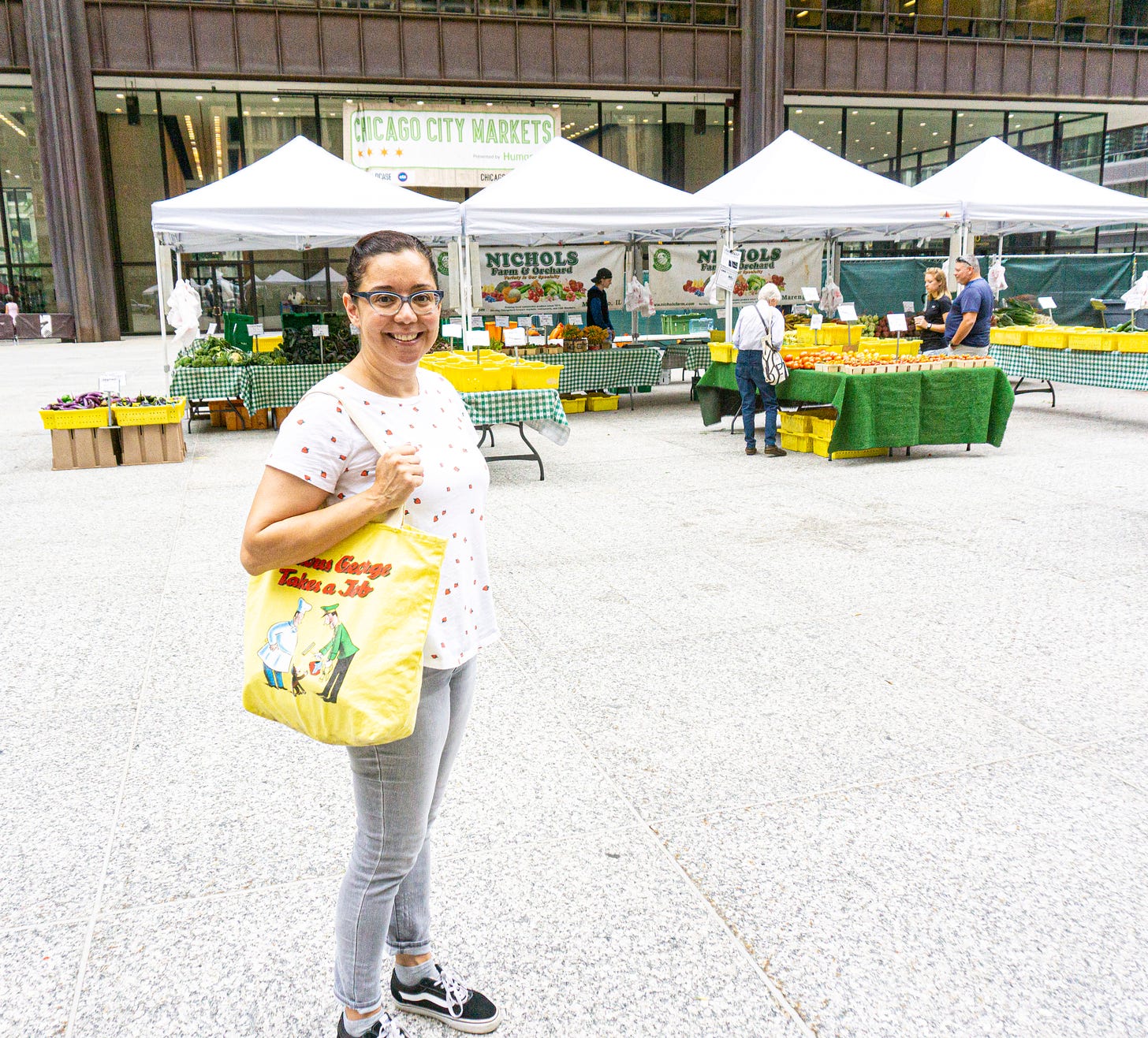
Chicago City Markets and Farmers Market Week
National Farmers Market Week begins Sunday, and today we continue our series of discussions with leading farmers market advocates. That description perfectly fits Yescenia Mota, who has managed the public Chicago City Markets program for 18 years.
Having met Yescenia several years ago in my work for FamilyFarmed, it was interesting to hear in our interview (which produced the excerpted Q&A below) that she had no prior experience running farmers markets; she had to learn on the fly when the program was shifted from the mayor’s office to the city’s Department of Cultural Affairs and Special Events (aka DCASE).
She quickly learned that some vendors were buying non-local products wholesale and selling them at Chicago City Markets. This was a practice driven home when she saw one vendor peeling stickers off peaches in May, about two months before local peaches are ready for market.
With the help of Abby Mandel, who founded the independent Green City Market in 1999 and ran it until her death in 2008, Yescenia established that Chicago City Markets would sell only products grown by the vendors in the Chicago food region (which surrounds Lake Michigan).
Yescenia is also a strong voice for enabling lower-income buyers to use SNAP/Link food assistance benefits at farmers markets and programs that double those benefits up to $25 per purchaser per week.
This year, DCASE is managing Chicago City Market’s flagship location at downtown’s Daley Plaza and eight markets that serve under-resourced neighbohoods on the city’s South and West sides.
———————
Q: What are your plans for Farmers Market Week at Chicago City Markets?
A: I have access to the Instagram accounts for the Chicago City Markets as well as a Facebook page. On Sunday, which is the first day, I'm going to be at Maxwell Street Market and kick it off by posting about Maxwell Street, having Nikki [Market Manager Nikki Butler] go live on Instagram and Facebook, maybe taking some questions from whoever's watching us, like what are some of your favorite things to see and do at farmer's markets?
Starting Monday, we're going to showcase the vendors, showcase one of our markets. I'll be posting at least two to three times a day. I really want to showcase some of the new vendors that we have. We have some great bakeries, great farmers like Parra Farms. We don't have many Latino farmers, and this is a small mom-and-daughter farm from Berrien Springs, Michigan. So I'll talk about them, what made them go from being helpers on a farm to renting out this acre farm on their own, and how can we help them thrive?... We're really just trying to focus and put the spotlight on our markets and our vendors.
Q: Let's talk a little bit about Chicago City Markets and their background. When people talk about farmers markets in Chicago, they do tend to focus on Green City Market or Logan Square. But Daley Plaza was there before farmers markets were cool.
A: Exactly. The program itself goes back decades, but back then it was with the mayor's office, special events, and now DCASE. We morphed into doing so many different things. I got hired and I started the farmers markets with Ron Salazar in 2003 and I'm not lying, it came from Consumer Services and the only thing they gave him and me was a box... I just started typing, copying the application. My background, my degree is in Behavioral Science. I worked in the mayor's office, I did sponsorship and I did programming and permits... All I knew is that Daley Plaza was the longest-running farmers market in the city...
There was a [vendor] there from Michigan and he was peeling stickers off his peaches [in May]. I was like, oh, what you doing? He says, “Just getting ready.” I said, “I don't think this is right.” But it was our first year, we didn't know anything, we let it slide.
There were 32 markets then. You had downtown markets, then you had the neighborhood markets and you had the bi-weekly markets and then you had the monthly markets and then you had the special event markets and then there were preseason markets. So we had to literally run these markets... Now we are at nine. I learned to incubate markets and hand them off. The Logan Square market was started by between me and the [Logan Square] Chamber of Commerce. And once it was somewhat viable, we told them, you take it. Same with Wicker Park, the Museum of Contemporary Art [now the SOAR Market], and Hyde Park. We realized we're a public servant. I know what I can do and I can only do so much. The best way is to have somebody who's in the neighborhood.
Interest in local food and farmers markets was taking off anyway... People want to know where their food comes from... So we recreated all our stuff to be very transparent.
Food has always been around Chicago, it has always been big. It is from the farmer to the restaurant. During the pandemic you'd be amazed how many people I saw getting boxes of fresh fruit... People want to eat good quality food... When I started not everybody was cooking or knew what to do, but by all means that has changed, it has with the Internet, with your smartphones. I think more and more people are cooking.
Q: You know I've always been this huge proponent of the farmers markets because I like to call them the starter drug for the good food movement.
A: The food sells itself. If it doesn't taste good, it doesn't matter. All the other values don't matter.
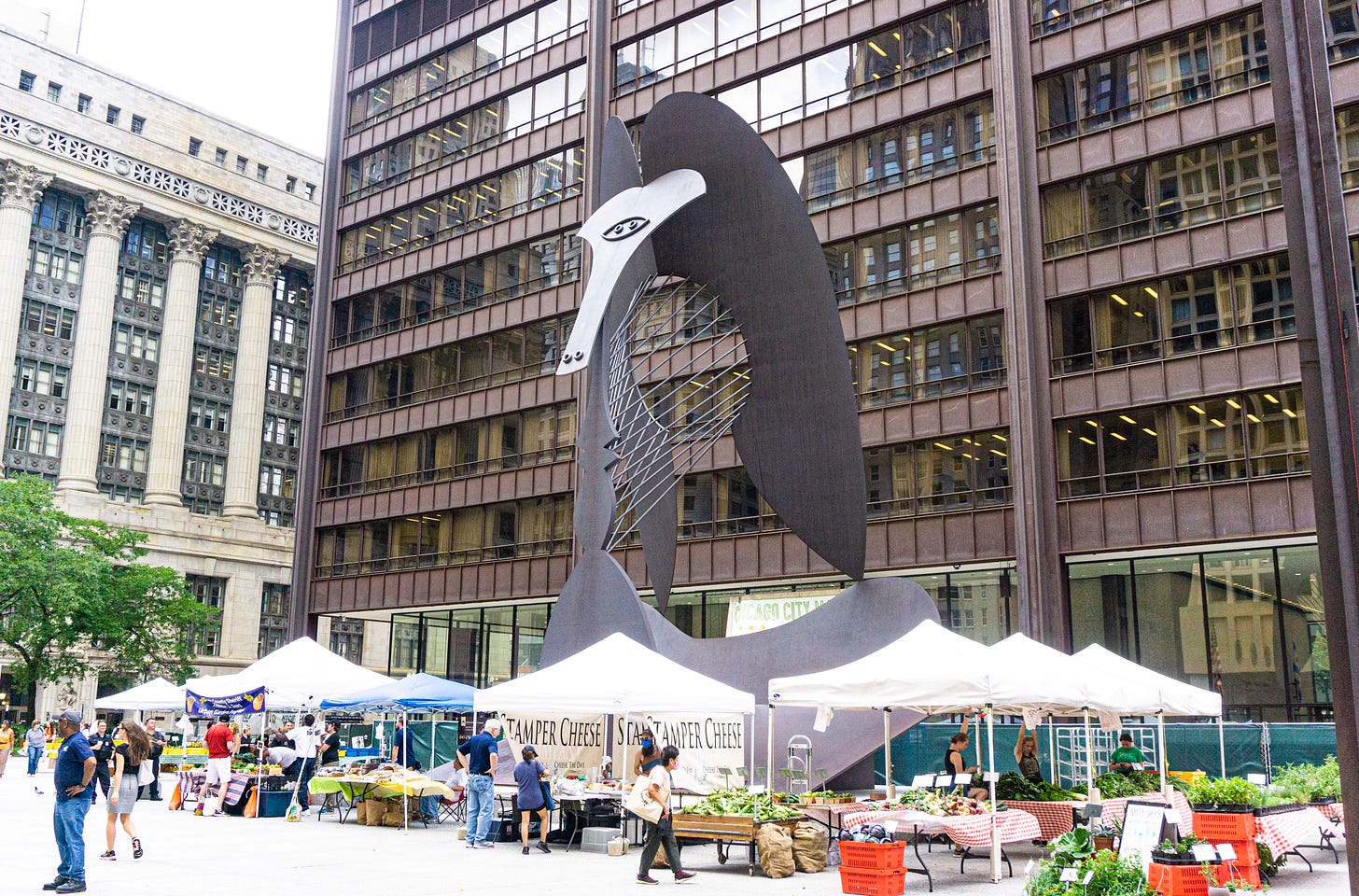
Q: So let's talk a little bit more about Daley Plaza and what this year is like. It's an unusual situation as a market in this part of downtown, where it wasn't just people coming from the neighborhood, but people who worked downtown as well.
A: People always say it's not a neighborhood market; it’s a certain demographic. It is not. Daley Plaza has always done, at least on a low end, $900 in Link sales in one day, that's great. And for the longest time we did over a thousand and we were the tops in the state... People forget that it's theirs. The court is there, there's traffic court, there's marriage court, there's Cook County, there’s state. There's the working class that are blue collar and are still collecting SNAP benefits because they don't make enough..
We brought it back this year [Daley Plaza and most of the other Chicago City Markets never opened in 2020 because of the COVID safety protocols]. We started early in the season again. There were still a ton of COVID restrictions... Our vendors held on and now they say we're finally starting to sell out. We're probably at 65 percent of our normal sales now. That's fantastic, and it definitely gives me some hope.
Where Was the ILFMA Bag Guy Yesterday?
Yesterday we visited Green City Market in Lincoln Park. The market was founded by the late Abby Mandel in 1999 and began its existence in the alley next to the Chicago Theater on State Street. Not long after, the market became a fixture at the south end of Lincoln Park, named for Abraham Lincoln. The residents east of the market are just animals because… it’s Lincoln Park Zoo.
And Today?
This location hosted a farmers market long before farmers markets were cool. The vendors and customers are literally in the Loop. And a giant looms over and keeps watchful eyes on the market. (This is a virtual open book test.)
He Wags for Queso
One of the fun things about farmers markets is the number of dogs who accompany their humans. I like to pop in the occasional pooch photo, and on Wednesday, when I was taking some photographs at Green City Market, a woman asked if I wanted a pic of a cute dog.
Of course I did. This good boy’s companion also told me that he is responsive to the words queso and pollo (Spanish for cheese and chicken).
So wait… Cute? Facial hair? Responsive to queso and pollo? It’s like this dog and I were separated at birth.




